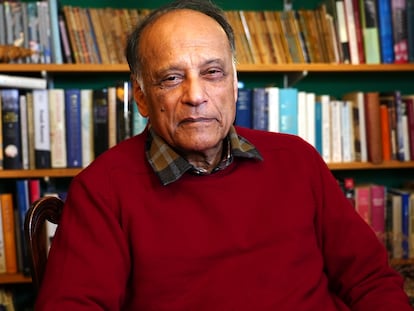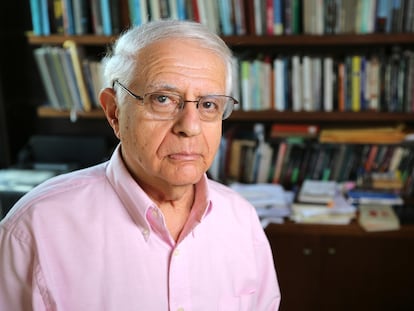Blanchard, Galí and Woodford win the Frontiers of Knowledge Award in Economics for their contributions to the design of monetary policies

Madrid - CET
The BBVA Foundation announced on Tuesday that it has awarded the 17th Frontiers of Knowledge Prize in Economics to Olivier Blanchard (Paris School of Economics and MIT), Jordi Galí (Pompeu Fabra University) and Michael Woodford (Columbia University). They received the award for “analyzing the stabilizing effect of monetary and fiscal policy on the cyclical movements of real economic activity, unemployment and inflation.” Their contribution has been key in a difficult time such as the Great Recession that hit the world from 2008 and the subsequent debt crisis, laying the groundwork for central banks to respond to these enormous challenges with unconventional monetary policies.
The studies of the prizewinners focus on the evolution of prices and interest rates, linked to the behaviour of economic agents. “They laid the groundwork for a new model that tries to avoid fluctuations in economic cycles and keep unemployment and inflation at relatively stable levels,” said Fabrizio Zilibotti, professor of International and Development Economics at Yale University and member of the jury. Their analyses have been the seed for central banks to design policies different from the past, such as the massive purchases of sovereign debt carried out during the financial crisis. “To reduce the deficit, spending must be cut. I have worked to achieve fiscal consolidation that would not cause too much pain,” explained the Frenchman Blanchard after receiving the award.
The jury highlights that the winners are “central architects of the neo-Keynesian paradigm” that has guided monetary authorities in recent years. The winners met in the 1980s; Blanchard, in fact, was Galí’s thesis advisor and Woodford’s professor. By then, the French economist had already delved into issues related to speculative bubbles and their impact on the economy. One of his main contributions dates back to 1987, when he published an article on the effects of monetary policy in monopolistic markets, highlighting the importance of nominal distortions: if households are pessimistic, they spend less and aggregate production falls. And it is a distortion that must be addressed in order to avoid recession.
“The answer we gave was that there was a price externality in the sense that, in an environment of imperfect competition, those who set prices had very little incentive to change them in response to demand,” explained Blanchard. About 10 years later, in 1997, the American Woodford published an article in which he developed an econometric research that laid the foundations for the new monetary policy model. Two years later, it was Galí who expanded this theoretical framework, focusing on the so-called Taylor rule, which links prices to interest rates and the behaviour of GDP or aggregate demand.
This neo-Keynesian model, explained the researcher born in Barcelona 64 years ago, is based on three equations: the first describes the behavior of the economy based on the interest rate, the second focuses on the evolution of inflation according to the level of activity and the third focuses on the actions of the monetary authorities.
The jury that awarded the prize was chaired by Eric S. Maskin, professor at Adams University in the Department of Economics at Harvard University (United States), who was awarded the Nobel Prize in Economics in 2007. He was accompanied by Manuel Arellano, professor of Economics at the Centre for Monetary and Financial Studies (CEMFI) of the Bank of Spain, as secretary.
Last year, the award went to Cambridge University economist Partha Dasgupta (Dhaka, Bangladesh, 81 years old) for “his pioneering work on the interaction between economic life and the natural environment, including biodiversity.”
Do you want to add another user to your subscription?
If you continue reading on this device, it will not be possible to read on the other device.
ArrowIf you want to share your account, change your subscription to Premium mode, so you can add another user. Each one will access with their own email account, which will allow you to personalize your experience at EL PAÍS.
Do you have a business subscription? Click here to purchase more accounts.
If you don't know who is using your account, we recommend changing your password here.
If you choose to continue sharing your account, this message will be displayed on your device and the device of the other person using your account indefinitely, affecting your reading experience. You can check the terms and conditions of the digital subscription here.

She is an editor in the Economics section of EL PAÍS and specialises in Finance. She has a degree in International and Diplomatic Sciences from the University of Trieste (Italy), a Master's degree in Journalism from EL PAÍS and is a Specialist in Economic Information from the Menéndez Pelayo International University.
EL PAÍS








